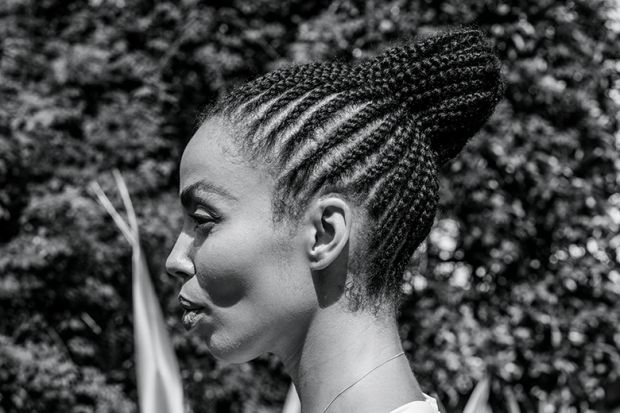Emma Dabiri describes herself as Irish, black, mixed race and Yoruba. She has an Irish mother and largely grew up in Ireland but spent her earliest years living among her father’s extended Nigerian family in Atlanta, Georgia. She is now working on a PhD at Goldsmiths, University of London “looking at the scholarship around being mixed race”.
Like many doctorates, Ms Dabiri’s generated a number of false starts. One was a section on dating preferences that fed into a much discussed Channel 4 documentary that she presented in 2017, Is Love Racist?, exploring how apps now allow people to filter out potential partners by race. Another forms the basis for her new book, Don’t Touch My Hair, about “why black hair matters”, shortly to be published by Allen Lane.
This draws extensively on Ms Dabiri’s childhood experiences in Ireland, when her typically West African hair made her feel “just like I was an exhibit. Strangers would break off conversations and come and touch my hair without asking and then discuss it with each other in disgusted fascination.” It wasn’t until she went to do a degree in African studies and history at SOAS University of London (where she is now a teaching fellow responsible for a class on culture in Africa) that she encountered very different attitudes among the privileged “white hippies” on the course: “My hair looked terrible…It was just tangled hair, just a mess. And they were like ‘Wow, that looks so cool’.”
Here we find one of the central political claims of Don’t Touch My Hair, Ms Dabiri explained to Times Higher Education: “The words that are routinely used to describe my black hair texture are ‘coarse’, ‘unruly’, ‘defiant’, ‘wild’, ‘rebellious’ – and the resonance between that language and the language of slavery and colonialism is [no coincidence]…The taxonomy of race has been globalised. It started during the period of scientific racism with white upper-class British men at the apex, and everyone else ranked with decreasing value until you get to Africans, who came just before monkeys…One of the markers used to identify black people as much lower down that hierarchy was hair. They didn’t have hair but wool – it was closer to the fur of animals.”
In their attitudes to hair, just as in their dating choices, Ms Dabiri went on, “people believe that they are autonomous actors and their decisions are based on their own personal choices, but if everybody was making autonomous choices they wouldn’t be making such similar choices…It’s what they’ve been told, almost programmed, to believe.”
Some of her own feelings became clear to Ms Dabiri at a recent material cultures conference at Goldsmiths focusing on hair. Other participants were happy to hand out samples of hair for inspection, but she “realised I was very reluctant to pass my hair round the room”, since she had internalised the views of her Trinidadian stepfather who “would warn me that your hair shouldn’t fall into a stranger’s hands, an idea which is very common throughout the Caribbean and Africa. It comes from the potency of hair and belief in the power of hair, that if people have access to your hair, they have some degree of control and can do some magic on you.”
Don’t Touch My Hair ranges widely across the African hairstyles that have survived from ancient Egypt until today, the escaped slaves who braided maps into their hair, the birth of black hair styling salons and products, and today’s Natural Hair Movement. Yet the styles most suitable for West African hair, which have been stigmatised and then stolen by white people, also illustrate a much wider history of stereotyping and cultural appropriation. Elvis was only the King of Pop, Ms Dabiri suggested, because of “the thirst that existed among the American public for the stars of black performance, which they wanted to see without the inconvenience of blackness”. She also urges looking again at the Yoruba, Ashanti and Mende cultures of West Africa for “solutions to undoing some of the contemporary issues we are grappling with”, for example around race, gender and environmental damage.
Nonetheless, she admitted that “ideas about race are incredibly potent and entrenched. They are not something that can just be legislated against…Nobody has worked out how to undo the potency of the spell that was the invention of race.”
POSTSCRIPT:
Print headline: PhD student’s book explores ‘why black hair matters’
Register to continue
Why register?
- Registration is free and only takes a moment
- Once registered, you can read 3 articles a month
- Sign up for our newsletter
Subscribe
Or subscribe for unlimited access to:
- Unlimited access to news, views, insights & reviews
- Digital editions
- Digital access to THE’s university and college rankings analysis
Already registered or a current subscriber?








